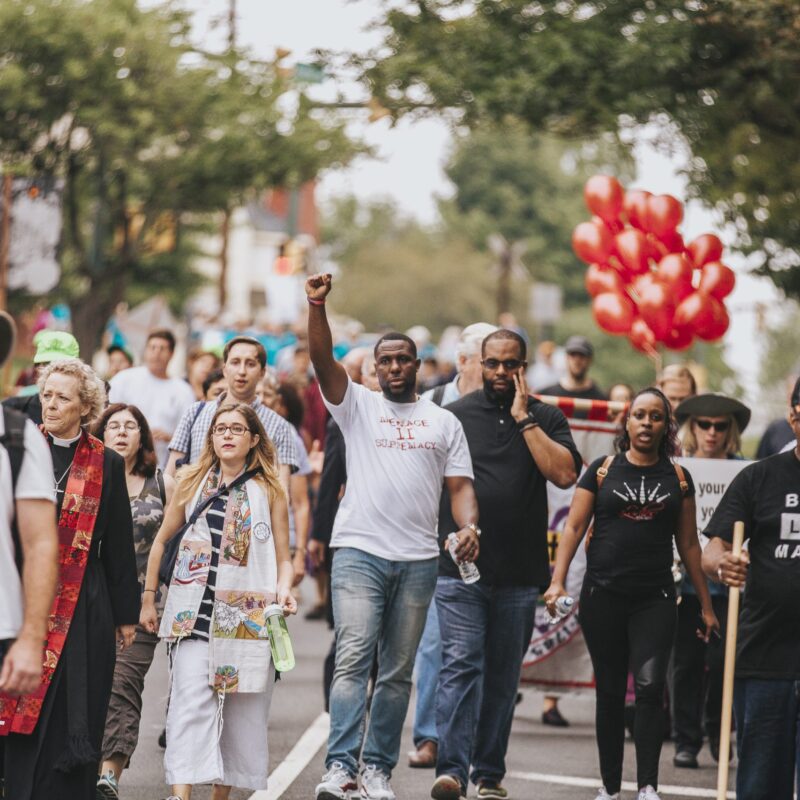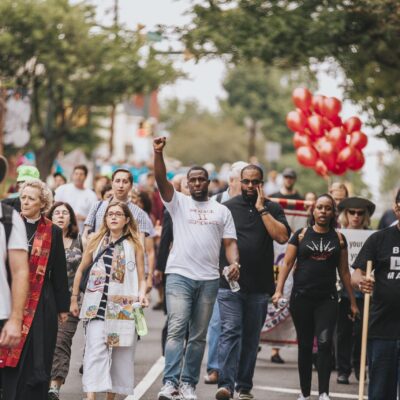Just back from Boston, where he caught a Red Sox playoff game, UVA’s Michael Klarman sits down with C-VILLE to talk about his new book, interesting cases on the Supreme Court docket and why war plays a larger role in American race relations than you’d think. Here’s an edited transcript of the conversation.
C-VILLE: I understand you’re kind of the resident Supreme Court expert.
Michael Klarman: There are a lot of people in the building who know a lot about the Supreme Court. I focus on civil rights history, I’m mostly a Constitutional historian, so I probably know more about the history of the Supreme Court than most people who teach just the basic common law course. But most of my scholarship is about, a lot of it’s about race, and constitutional law involving race, and how those issues have changed over time. I’ve written a lot about Brown v. the Board of Education, talking about what was going on inside the court when they were talking about it, trying to figure out what the connection is between Brown and the Civil Rights Movement.
So, what is the connection? I’m sure there’s not a two-word answer to that.
There’s not, no. The conventional view is that Brown was kind of a cataclysmic event that inspired the Civil Rights Movement. My argument is that Brown was much less important in the positive sense of inspiring the Civil Rights Movement than it was important in a very different, almost paradoxical sense. The short-term effect of Brown in the South was to dramatically polarize politics. Brown led white Southerners to dig in their heels and put up a massive fight against desegregation. It also created a political climate that was ripe for violence.
The most extreme politicians imaginable were being elected because Brown had this effect on public opinion in the South. And my argument is, when the Civil Rights Movement developed on the street, and intersected with these rabidly segregationist politicians, you’ve got conflagrations in places like Birmingham and Selma, Alabama, and that’s what sparked a national civil rights consciousness. So, Brown, actually in the short-term, made things worse in the South, but by doing that, it ultimately accelerated civil rights progress because you had to bring out the worst in white supremacy and put it on display for the country before people were mobilized to do something about it.
Right, which was the tactic of the Civil Rights Movement. The nonviolent…
That’s exactly what they were strategically trying to do. They understood that, maybe a sort of simplified way to put it is, their initial strategy was to try to persuade white Southerners to see the error of their ways, they then realized that wasn’t going to work, and the alternative strategy was to kind of subject themselves to violence and hope to cultivate a sympathetic outside audience. Gandhi’s strategy.
How do you see the school system now? Fifty years later. I’ve heard a lot of arguments that it is moving towards even more radical segregation, even now.
There’s a lot of scholarly discussion on the 50th anniversary of Brown in 2004 about whether Brown ought to be regarded as a success. I think the starting assumption was we’re celebrating a great decision, but a lot of people pointed out that in many ways things are actually worse off than they were, at least on the school segregation issue. So I think these things are complicated, but, outside of the South, I don’t think there’s any doubt that the schools are more segregated now than they were.
What’s the cause for that reversion?
The basic problem underlying school segregation is housing segregation, given that we have a strong tradition of people going to school near where they live. If blacks and whites live in different neighborhoods, then they’re likely to go to different schools. Courts, federal courts, temporarily intervened in that by ordering students to go to schools that were not in their neighborhood, but that was kind of a short-term solution and public support for it ran out eventually, not just among whites but I think also among African Americans. The courts started suspending those orders in the ’80s and ’90s, and now there are many fewer school districts under court order to desegregate, and the other thing is the Supreme Court’s decision last summer saying that you can’t voluntarily pursue desegregation in the ways that some school districts have tried to do.
What’s your take on that?
In some ways, the decision is just outrageous because the Court’s taking the 14th Amendment and giving it a meaning that it never had when adopted, and that’s a really dodgy thing for conservative justices who proclaim their allegiance to original intent to do. The 14th amendment was not about colorblindness. The people who wrote it were too racist to be willing to embrace a colorblind constitution. So basically they’re reading into the Constitution a value that they happen to believe is important, but that’s exactly what they attack liberal justices for doing.
The other thing to say about it is, you know, it is probably an accurate reflection of what most people in our society have evolved toward. There isn’t a lot of support anymore for federal government action to promote integration. So, it’s pretty striking the number of school districts that voluntarily promote integration, which is what this decision is about. It’s actually a relative handful of school districts. There are 15,000 or 20,000 districts in the country, so we’re talking about, at most, 5 to 10 percent of school districts, and the Court’s telling those districts, which are very unusual districts because they’re committed to trying to integrate, it’s telling them, "No, you can’t do it."
You know, I think it’s sad, but I think it kind of reflects where we are as a society. Which is another big theme of my scholarship, that the Supreme Court never gets very far out of touch with dominant opinions. We have this image of the Supreme Court as kind of a heroic institution that defends minority rights, but in fact, the Court never protected women before the women’s movement, the Court never protected blacks before dramatic changes in World War II that were creating the Civil Rights Movement, the Court never protected gays until the gay rights movement. The Court never is that out of touch with society.
What are some of the things you’re doing now?
I just published a book on racial equality in American history. It’s a short book that’s geared toward a more popular audience. So I tried to, in a relatively few words, tell the history of race relations and racial change in the United States.
There’s a fair amount of constitutional law in there, but a lot of it’s not about constitutional law, it’s about politics, it’s about why race relations and attitudes change over time. I talk a lot about the importance of war. It turns out, maybe ironically, that war is one of the most important forces behind progressive racial change in American history.
Really? Can you point to some examples of that?
Yeah, the Revolutionary War is pretty much what ended slavery in the north. Before the Revolutionary War, many people don’t know that it’s a fact that Northern states were pretty significantly invested in slavery, and economic forces and ideological forces set in motion by the Revolutionary War led Northern states to put slavery on the road to extinction. And actually, for a brief period of time, it also began to undermine slavery in the South, but it only lasted for maybe a decade or so.
Then the Civil War, of course, not only ended slavery but resulted in postwar amendments that guaranteed blacks political and civil equality, and part of the argument in my big book on Jim Crow and civil rights, is that World War II is really the beginnings of the modern Civil Rights Movement. So, the argument’s been made by some political scientists, actually a more extreme form of the argument that we only make racial progress during war time and then after war there’s a period of retrenchment. I don’t know if I’d go quite that far, but I think it’s hard to deny a close correlation between big wars and progressive racial change.
Well, being so close to it right now with the war in Iraq, do you have a feeling for any kind of changes that may come out of this 10, 15, 20, 30 years down the road?
First of all, the war in Iraq is very different from the Civil War, the Revolutionary War and World War II. Those were total, all-encompassing wars. The war in Iraq, really, directly affects almost nobody in the United States if you’re not one of the people whose volunteered for military service, in which case you’re risking your life over there in Iraq. The American economy hasn’t changed, people’s day-to-day life hasn’t changed, so it’s not a total dislocative war like World War II was.
You know, World War II, 12 to 15 million people served in the military at some point, massive dislocations, people moving from the rural South to the urban North, cities growing by leaps and bounds to provide personnel for airplane factories. The war in Iraq just doesn’t have that sort of effect. There are a couple kind of speculative points you can make. I think the war in Iraq will have a positive effect on gay rights.
One thing that happened immediately after 9/11 was that it became known that there were very few Arab translators in the military, and for some reason that I don’t think anybody understands, a disproportionate number of them were gay and fired, and a lot of people said this is really dumb. Right? We don’t have a lot of people who have this really important skill, and you’re fighting these guys, you don’t need to be making war on these guys who are loyal Americans. That’s not the only reason why gay rights are at a propitious time, it’s also because young people have no problem with issues like same-sex marriage.
But I think the war is helpful, and you know, if there’s a Democratic president and Democratic congress, the first thing to go is going to be "Don’t Ask, Don’t Tell." I think that’s pretty clear. Some people predicted immediately after the war that it would have a beneficial effect on African Americans because there was kind of a new enemy and the enemy was Muslim extremists, and that would make African Americans seem, I don’t know, more like just Americans. We don’t recognize that today, that’s a part of our past, but war played some role in integrating Catholics into the American mainstream. I think it had the same effect on African Americans.
I’m wondering if you followed the Jena 6…
Only what I read in The New York Times.
What’s your quick take on that?
I guess I think two things. One, part of the grievance is that white students had used, sort of, symbolic hate speech and nooses and so forth, and that wasn’t taken very seriously. That’s not a good thing, but I think there’s a difference between speech and action, and if you’ve actually beaten somebody up, I think you deserve to be punished more severely than if you’ve only engaged in what I think is hateful hate speech, but it’s actually probably protected by the First Amendment.
So, I don’t think you can treat these actions as equivalent. If somebody engaged in assault and battery, that’s a crime that should be punished, and somebody who engages in hate speech is something that the community should despise, but isn’t something that is going to warrant criminal punishment because it’s probably protected by the First Amendment. On the other hand, it seems pretty clear that the black teenagers have been hit awfully hard for action that probably doesn’t really qualify as second degree [attempted] murder, which I think is what they were being prosecuted for. You know, there’s still tremendous racial discrimination and resentment, especially in parts of the deep South, especially in rural communities.
We like to think that the open white supremacy of 50 years ago has been buried and we’ve moved beyond it, but a lot of it has just been brushed below the surface and is still there, so I’m not surprised to hear that stuff like this goes on. We delude ourselves into thinking we’ve made more progress than we have, and I don’t deny that there’s been significant progress in many areas. I mean, you could have a black person elected president in 2008—that’s unthinkable 50 years ago. On the other hand, you know, these black and white kids in this high school, they’re completely segregated, they don’t sit together at the lunch counter, they don’t go to the same classes, the white kids go to accelerated tracks, the black kids go to tracks that aren’t going to college. And, you know, it turns out that the white kids are happy to threaten the black kids with a lynching.
So, we’ve made less progress sometimes than we’d like to think. And we see it in politics too, some of the outrageous stuff that goes on. People like to forget that when Ronald Reagan began his presidential campaign in 1980, he began it in Philadelphia, Mississippi, and the idea that we would brush that aside and accept the fact that it’s about Federalism and States’ Rights? I mean, this is appealing to the racist instincts of Southern whites who have traditionally voted Democratic and being recruited into the Republican party.
Do you see a continuation of that strategy?
We saw it in the Senate race in Tennessee in 2006, right? They used commercials.…I don’t know if you remember this, it was, [Harold] Ford was the Democratic candidate, black congressman from Memphis, and they ran these ads with a white Playboy bunny making suggestive sexual overtones, playing on these sort of fears that still exist with interracial sex, and that’s not…people condemn it, but on the same hand, some Republican operative is producing this.
And they’re producing them for a reason.
They’re producing them because they work. I don’t know how partisan you want me to be, but I sometimes wonder how Republicans look themselves in the face and don’t just repudiate what their party stands for. I mean, this is the worst form of tacit appeal to racist instinct, and it still works, so you capitalize on it. Somebody needs to condemn this stuff.
What do you see as some of the big cases coming up on the Supreme Court dockets?
There are a bunch of cases, and this is pretty interesting. I’m borrowing here from something that one of the Supreme Court’s most astute observers, Tom Goldstein, says. Last term the court decided a bunch of cases by 5-4 margins and the conservatives won most of them. So the general consensus was the court’s swinging to the right, Alito and Roberts have influenced the outcome just as Kennedy maybe is leaning a little bit to the right, and the liberals lost on partial birth abortion, and they lost on campaign finance regulation, they lost on student free speech rights, they lost on establishment clause challenges, they lost on voluntary integration. So it was a big year of liberal losses. Partly, that’s an accident of what cases happen to be on the docket.
And it turns out that this year, there are a bunch of cases where the liberals might actually win, because everything turns on Justice Kennedy. He’s the fifth vote, and there are a bunch of cases where
he might vote with the liberals. For example, there’s another case involving whether Guantanamo detainees can get into federal court on this ancient writ of habeus corpus. Congress has tried to deny it to them, but there’s a question of whether Congress has the power to do it, because traditionally, you can only suspend habeus during invasion and insurrection, and Congress hasn’t said there was an invasion or insurrection, so most commentators think that the Court’s going to reverse the lower court and hold that it was unconstitutional for Congress to suspend habeus.
Everybody’s on edge wondering if they’ll take the D.C. gun law case. That would be a big deal. They just took a highly politicized case involving voter IDs. A big issue since 2000 has been Republicans in state legislatures requiring photo IDs to vote. These issues divide strictly on patrician lines in state legislatures. Democrats vote against because they think there’s an effort to suppress minority and poor people’s voting. Republican’s say it’s an effort to stem voter fraud. Republican’s pass these when they have the majority, and courts, it turns out, evaluate them along partisan lines. Most people seem to think that the Supreme Court will side 5-4 and say these are permissible.
Go back to the D.C. gun law, the Second Amendment. What’s your reading on that?
I have no idea what they’ll do if they take it. They haven’t taken it, but a lot of pundits think they will take it because the federal circuit courts are divided and that’s usually a pretty good predictor as to whether the Supreme Court will think it will have to step in and resolve the conflict. The reason it’s hard to tell is that there are almost no Second Amendment cases in the Supreme Court, so there is very little evidence of what these particular justices think.
The precise issue is whether the Second Amendment protects an individual right or a collective right. And historians just disagree. There’s evidence on both sides. What that means is it’s easy for justices who’re committed one way or the other to fight historical support for their position. I think it’s an interesting historical question because you hear a lot of rhetoric about judicial restraint. This will be a test of that because I think it will require a fair amount of activism to get involved, given that the dominant view among courts is that the Second Amendment is a collective right, not an individual right.
Is the Second Amendment just written really, really, really badly? Or was it left that way for a specific reason?
It was written badly. It starts with what’s known as a prefatory clause. It says something like "A well-regulated militia being essential to the security of a free state," and then there’s a comma. And then there’s something that sounds like a right: "The right of the people to keep and bear arms shall not be infringed." Well, the second part sounds like an individual right, but the first part sounds like a collective limitation. And it’s not clear how the two parts should be fit together.
Then there’s a question about what "keep and bear" means, which is a big debate in the D.C. circuit opinions about whether "bear" has a military connotation. And it turns out there’s some ambiguity in the historical literature, and it’s also the case that the amendment also says "bear arms," it doesn’t just say "keep." So some people say even if "bear" has a military connotation, "keep" sounds like it’s more expansive than that.
In going back and parsing this language, how much do you have to know about the grammatical quality of the language back when it was written? How much does syntax and the history of the language, as it evolved, come into play?
It is possible to read into the framers’ specific language and grammatical construction more than is really there. They were doing a lot of this quickly. There is a lot of historical scholarship. Historians have gotten interested in this in the last 20 years. You can trace these formulations back to British precedents. You can look at state constitutions, which use similar terminology. You can look at forms of the amendment that were proposed and rejected. You can look at the language, what was accepted and rejected.
In Pennsylvania, people who opposed the Constitution had proposed an amendment that talked about a right to keep and bear arms and specifically said something about a right to keep and bear arms for hunting. They clearly thought a right to keep and bear arms included hunting. There’s a lot of information. Unfortunately it doesn’t point clearly in one direction or the other.
And people’s views on this are just driven entirely by their contemporary views about gun control. That’s often what Constitutional law is about. There are so many different sources for Con law, and so much indeterminacy within the sources, that you can find there a respectable argument for any position.
Like the Bible.
Exactly. There are absolutely close analogs between Biblical interpretation and constitutional interpretation.





